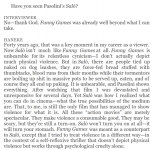version
Well-known member
I would quibble with the idea of him being thrilled by it, though I don't think you're entirely wrong; I think his stylization of violence, the slo-mo and squibs etc, are actually great examples, and clearly influential, of the sort of subjective filmmaking now much more prominent in action films (though for much different reasons). I was watching a commentary on The Getaway last night and the critics pointed out the opening sequence is replete with this subjectivity; just as in that opening scene in which time and space are so blatantly manipulated through editing, Peckinpah slows down and cranks up the volume in his shootouts for affect like any exploitation filmmaker, but this is because because he believes that is how we would actually process the events as primary witnesses and not out of the desire to thrill. I think this is why he is rigorously watching children's reactions to outrageous violence and the way they play-act it; consider the kids at the beginning of The Wild Bunch and the boy on the train shooting Doc with a water pistol in The Getaway. He is concerned with the symptoms of overexposure and desensitization, especially on the minds of children, and these are his attempts to critique violence in popular cinema. Again, you may be right that he was still thrilled by it, which I think actually makes sense and I would argue his style is also his attempt at self-criticism for his own proclivity for all kinds of violence.
If I remember correctly Cox said Pat Garrett was one of the only films they had with them on the set of Walker and watched it countless times during production.
Yeah, there's an argument stylising the violence and really cranking it up gets closer to 'the truth' of it as it forces you to really look at it, similar to Herzog's concept of 'ecstatic truth' that leads him to stage and manipulate things in his documentaries.
Peckinpah's stuff as self-criticism and him wrestling with his own taste for violence rings truer to me than the broader social function he was putting out there in that interview. The films being entertaining and thrilling whilst attempting to get to the bottom of why that is and ending up in this knotty, uncomfortable zone of folding in on and contradicting themselves feels more honest than the rigid, moralistic vision he sets out in that interview.
There's also the obvious counter of if you're concerned about violence in film then making the most violent films you can may simply be contributing to the issue you're claiming to critique and trying to have your cake and eat it.


